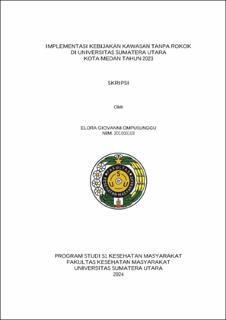| dc.description.abstract | The excessive consumption of cigarettes in North Sumatra Province has caused significant public health problems, adding to the burden of disease in the community. Despite the implementation of the Smoke-Free Area (SFA) policy as one of the mitigation efforts, its implementation, particularly in the Universitas Sumatera Utara (USU) environment, has faced several obstacles. The aim of this research is to analyze the effectiveness of SFA implementation at USU, focusing on the factors influencing the success of the policy. Through qualitative methods, data were collected through in-depth interviews, field observations, and document analysis at USU. The research findings indicate that the implementation of the smoke-free area policy has not been successful due to unevenness in SFA socialization, budget allocation not specifically earmarked for this initiative, variations in disposition (commitment) towards SFA, and an undefined bureaucratic structure supporting SFA. This study emphasizes that effective communication, strong disposition, adequate resource allocation, and the establishment of a solid bureaucratic structure are key elements in implementing SFA at USU. Insufficient socialization and understanding of SFA contribute to low compliance rates, while commitment and support from university leadership, along with resource availability, are identified as major determinants of policy implementation success. Based on these findings, this research recommends increased socialization efforts, strengthened commitment and oversight, adequate resource provision, and the establishment of an efficient bureaucratic structure. Specifically, enhancing internal disposition or commitment is the primary suggestion, as it will facilitate more effective and sustainable implementation of SFA policy at USU | en_US |


